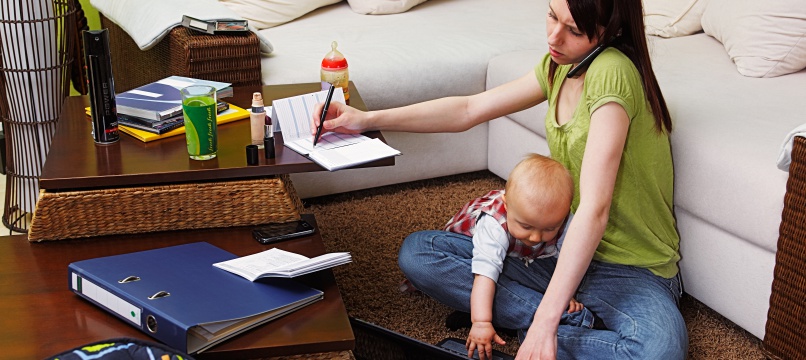By Lisa Brick
Media Multitasking, as we tend to do it in the Information Age, is disrupting your ability to navigate divorce with grace and dignity. The practice, as pervasive as it is, is hurting you by undermining your abilities to be calm and rational when it comes to communications with your yourself, your soon-to-be-ex (STBX), your attorney, and your children. Rather than a technique to boost efficiency, research indicates that media multitasking is actually a drain on the brain and therefore, a particularly nefarious practice during divorce.
While navigating divorce your brain is taxed to the max. Not only are your emotions bouncing around between calm and chaos, peace and panic but so are your STBX’s and your children’s. You feel the effects of all of it. At the same time your brain is in overwhelm as you learn how to take over the tasks your STBX used to handle in addition to what you already do. You are managing your children’s schedules plus the new co-parenting schedule. You are doing your best to figure out finances amidst everyone’s fears. You are legitimately concerned about where you will live and how you will afford it, all in an unpredictable environment. During divorce you need every neuron in your head working at its best while being hit with the worst.
Media multitasking has been shown to undermine the ability for single focus attentiveness. It leads to feelings of stress and anxiety thereby diminishing satisfaction and peace. Instead of increasing clarity and productivity multitasking increases the time it takes to complete tasks and reduces the quality of work accomplished, all while providing the illusion that doing more gets more done. Multitasking during divorce further frazzles brain cells.

How effective is it for you to further frazzle your brain? How well are you handling it when your STBX sends you those texts or emails that make your blood boil? When a new bit of information comes in from your attorney about some shenanigans the other side has pulled? What would change for you if you were not exposing yourself to these “hits” randomly in the midst of going about your day?
The last few decades of research into the human brain has introduced new findings about how the human brain supports individuals to function most effectively in his/her life. Optimal effectiveness as well as peak creativity occurs when an individual is able to focus exclusively on one task for an extended period of time. Yet in our day and age, we are call upon ourselves to regularly switch attention from one thing to another, things that have little or no relationship with each other and things, during divorce, that trigger strong and immediate emotional reactions. It is not at all unusual to be working on a project when a call comes through, a text notification rolls across the phone screen and a sound informs you that a new email has hit your inbox. What is happening within you each time you get a bing, ding, or ring? Are you feeling like so many of our clients express, waiting for the shoe to drop again?
In The Organized Mind: Thinking Straight in the Age of Information Overload, Daniel J. Levitin shares the results of a study conducted by Stanford professor Clifford Nass. His study, one of the first to upend the myth of the benefits of media multitasking, used highly intelligent and capable Stanford students divided into two groups: those who described themselves as heavy media multitaskers and those who prefer to complete one task at a time.
Professor Nass anticipated that his study would confirm the theory that high media multitaskers were superior achievers. The results showed the opposite! Compared to the control group of students, Dr. Nass’s heavy media multitaskers were unable to pay attention, control their memory, or switch from one job to another as well as the single focused students. The multitaskers had difficulty discerning relevant from irrelevant information and proved to be easily distractible.
Eyal Ophir, one of Dr. Nass’s colleagues, came to the following conclusion about the media multitaskers in the study: “They couldn’t help thinking about the task they weren’t doing. The high multitaskers are always drawing from all of the information in front of them. They can’t keep information separate in their minds.”
The detrimental effects of media multitasking are the result of the inordinate amount of energy the human brain expends each time it shifts focus. This energy drain results in mental exhaustion. When the human brain is exhausted it records new information in a disorganized way. When information stored in the brain is disorganized it is difficult to access, making it unretrievable for use.
Media Multitasking is an inefficient use of mind and a poor use of time.
So if media multitasking does not provide the productivity boosting ability we were once led to believe it did how do we manage in today’s information world while being bombarded with phone calls, appointment reminders, emails, texts, tweets, social media, etc. every moment of every day?
One recommendation is to organize your attention by scheduling what you will focus on when. By creating a place and time for the different things vying for your attention you can attend to them on your terms rather than on the random way they intrude on your mind. While navigating divorce it is vital to get things done effectively and efficiently and handle emotions carefully and consciously.
Exposing yourself to random and possibly disruptive communications that reroute your concentration from the task as hand and create emotional upheaval when you do not have time to assess and address the communication is counterproductive for you and everyone around you. It is also counterproductive to keeping your legal costs, walking away with the best possible divorce settlement, and a workable co-parenting relationship.
Rather than checking your email, texts, or answering your phone every time a communication comes through set aside a specific period of time at intervals you determine to look at your emails, texts, and listen to voicemails. I organize myself by allowing up to an hour every three hours to catch up on recent communications. Depending upon your circumstances checking more or less often may be more appropriate.
By creating distinct time periods to check on communications your mind can relax and focus, assured that you will know of any vitally important formation within a specified period of time, a period that you specified. When you look at potentially disturbing communications you will have the time to assess “how important is this?”, “does it warrant or need a response?”, “does it help me to make my case to the court?”, “what can I learn from this situation?” or “how can I use this to further my agenda?”
The benefits of allowing your mind to focus uninterrupted for periods of time every day are:
- Increased ability to focus
- Increased ability to discern relevant from irrelevant information
- Ability to accomplish more in less time
- Memory improvement
- A sense of calm
- Global application of information
Try it. Be your own experiment to determine how much more effective you can be by allowing yourself periods of focus uninterrupted by media multitasking.
Lisa Brick, Journey Beyond Partner
 Our team of coaches at JBD is passionate about helping men and women navigate the emotional difficulties of relationships, breakups and divorce. We work together with you to open the possibility that your current relationship challenges can lead to a rewarding voyage of self-discovery and an immensely more pleasing life experience. Together we create a path to clarity. Find out if Coaching is right for you, and accept my gift of one FREE session.
Our team of coaches at JBD is passionate about helping men and women navigate the emotional difficulties of relationships, breakups and divorce. We work together with you to open the possibility that your current relationship challenges can lead to a rewarding voyage of self-discovery and an immensely more pleasing life experience. Together we create a path to clarity. Find out if Coaching is right for you, and accept my gift of one FREE session.




